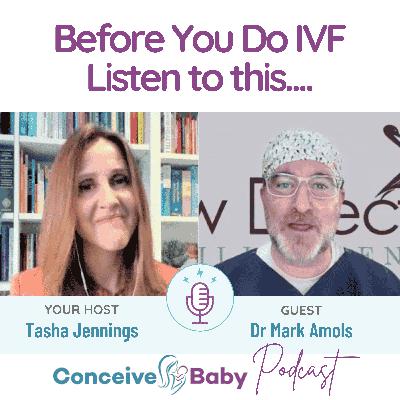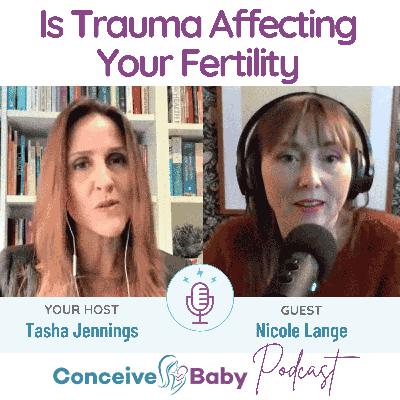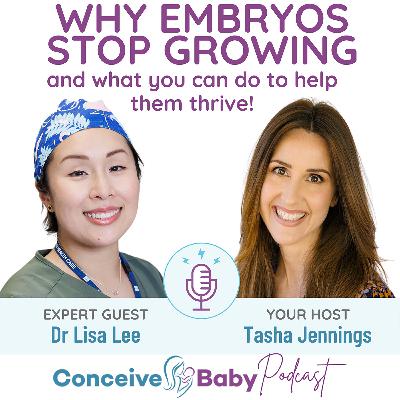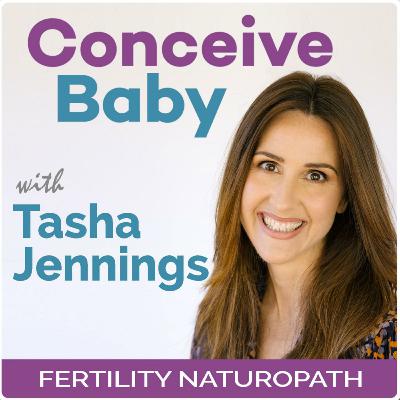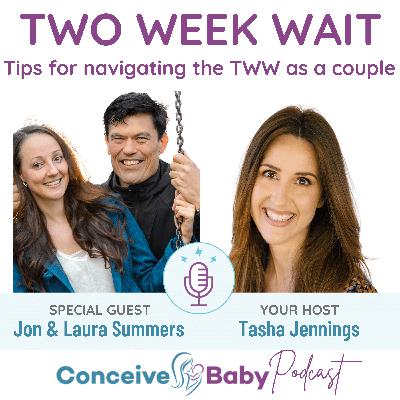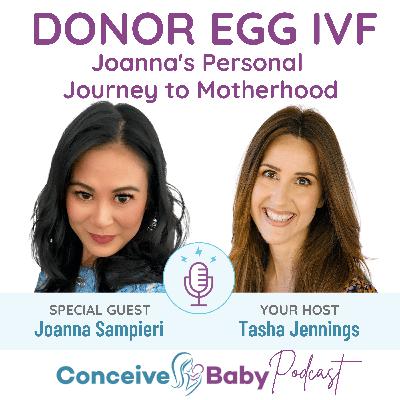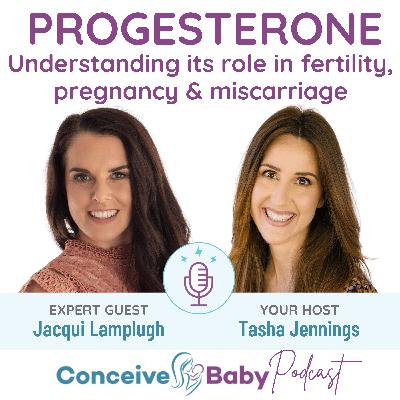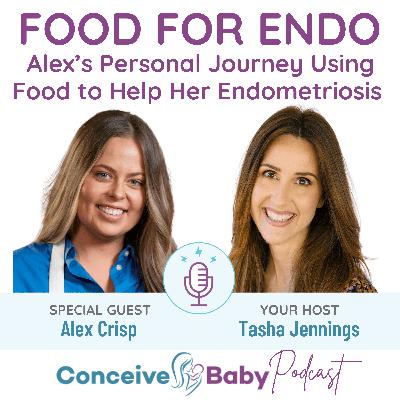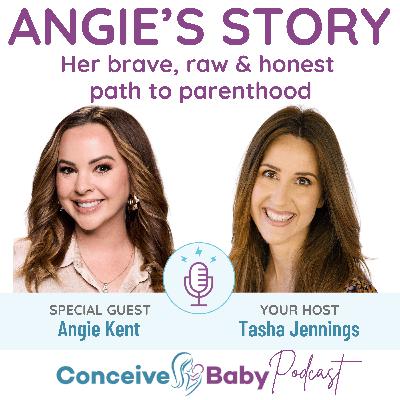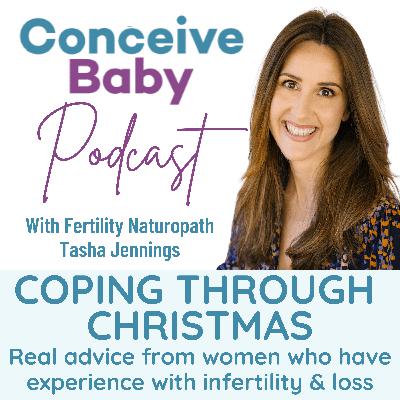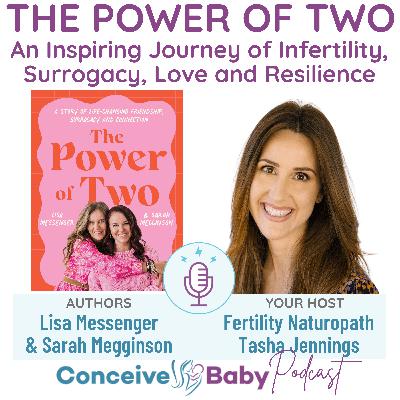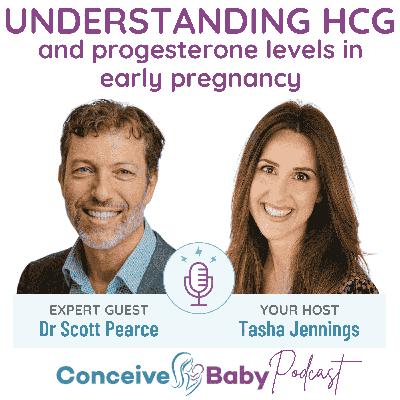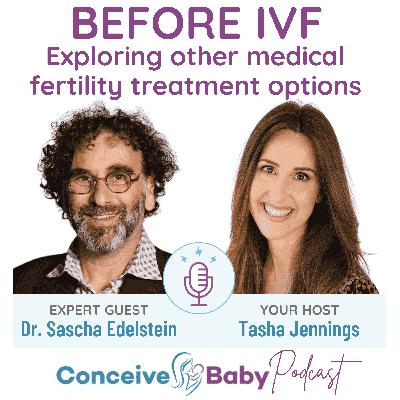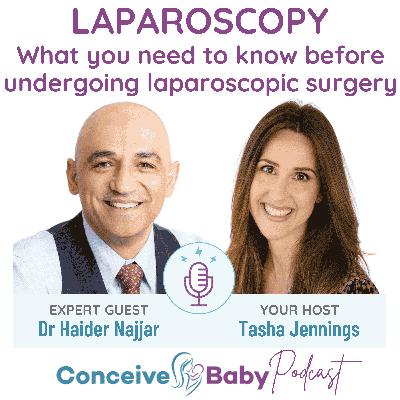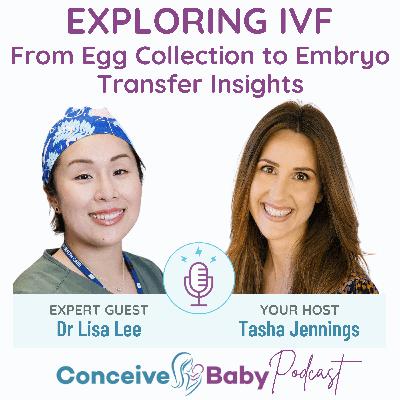Discover Conceive Baby
Conceive Baby

Conceive Baby
Author: Tasha Jennings - Fertility Naturopath
Subscribed: 14Played: 250Subscribe
Share
© Tasha Jennings - Fertility Naturopath
Description
Whether you have just started trying, have diagnosed fertility issues or going through IVF, the Conceive Baby Podcast provides direct access to leading fertility experts to help you achieve your baby dreams
84 Episodes
Reverse
Christmas is meant to be joyful.But when you’re trying to conceive, it can quietly become one of the hardest times of the year.In this special Christmas episode, Tasha speaks honestly about losing the joy of the festive season during her own fertility journey, and why Christmas can feel like a painful reminder of what hasn’t happened yet.You’ll hear from a group of trusted experts and advocates, all with lived or professional experience of infertility, pregnancy loss and IVF. Together, they share compassionate, practical advice to help you protect your heart, navigate family gatherings, and move through this season with more steadiness and self-kindness.This episode is for anyone dreading the questions, the triggers, or the quiet grief that can surface at Christmas.You’ll learn how to:1. Protect your energy during Christmas eventsYou don’t have to attend everything. Kirsten Mclennan shares why being selective, leaning on the infertility community, and creating new traditions can make this season feel more manageable.2. Use movement, breath and boundaries to stay groundedJen from Element Pilates & Yoga explains how gentle movement, sunlight, breathwork and having prepared responses can help you regulate your nervous system before difficult conversations or gatherings.3. Remember that you are not aloneMeg from For the Barreness gives you a permission slip to opt out of events and conversations if you need. And reminds you that you’re never alone in this journey.4. Communicate clearly and allow space for griefPsychologist Cath Corcoran outlines why explicit communication with partners and family matters, how authentic gratitude differs from toxic positivity, and why grief, sadness and disappointment are allowed to exist during the festive season.5. Slow down and honour the pauseJennifer Tupaea from Pink Elephants reframes the holiday shutdown as a chance to rest, reduce overwhelm, and create small rituals that support healing after miscarriage or loss.6. Find moments of joy without forcing themThis episode reminds you that joy doesn’t need to look like anyone else’s. Small pockets of peace, rest and meaning still count, and they matter more than ever right now.00:00 Christmas and the quiet grief of infertility01:26 Why the festive season can magnify what’s missing02:04 Kirsten Mclennan on selective events and community support03:26 Jen on movement, breath and setting boundaries06:15 Kath Corcoran on communication, grief and self-care10:54 Jennifer Tupaea on loss, rest and creating rituals13:45 A message of hope and kindness for the new yearMENTIONED IN THIS EPISODEKirsten Mclennan - Straight Up Infertility https://www.straightupinfertility.com/Jen - Element Pilates & Yoga https://www.elementpilatesyoga.com/Meg - For the Barreness https://www.forthebarreness.com/Cath Corcoran - Conception, Fertility & Perinatal Psychology https://cathcorcoran.com/Jennifer Tupaea - Pink Elephants Support Network https://www.pinkelephants.org.au/Tasha’s Your Fertile Pantry Program yourfertilepantry.comMentioned in this...
In this episode I speak with fertility and IVF specialist Dr Mark Amols about what IVF can actually do, what it can’t, and why so many women are sent down the IVF path without anyone ever asking the most important question: why.We explore the myths, the medical realities and the emotional toll of IVF, and Mark shares the practical, compassionate guidance he wishes every couple had before starting treatment. His insights blend clinical experience, personal IVF experience, and a deep respect for women’s autonomy in their fertility journey.You’ll learn how:1. IVF is powerful, but it’s not a magic fix.Most women are led to believe IVF has near-perfect success rates or will guarantee multiple embryos. Mark breaks down what IVF is actually designed to do (help you get one healthy pregnancy) and why failed cycles never mean you’re “infertile” or out of options.2. The ‘why’ behind infertility matters more than the protocol.Many couples are pushed into IVF without anyone investigating ovulation issues, sperm quality, endometriosis, PCOS, inflammation, medications or timing. Mark shows how identifying the root cause can completely change outcomes, and why failed cycles often reflect untreated issues, not that you’re “broken”.3. Preparation transforms outcomes for both men and women.Even small shifts to lifestyle, inflammation and hormonal balance can improve embryo development. Mark explains why diet, environment and timing matter, why sperm health needs equal attention, and how a few months of targeted preparation can radically improve IVF success.00:00 Debunking IVF Myths00:51 Empowering Women Through IVF02:10 When IVF is Necessary03:13 The Importance of Preparation05:45 Understanding the Why22:30 Personal Experiences with IVF26:51 Conclusion and Final ThoughtsMentioned in this episodeTasha’s Your Fertile Pantry ProgramWork with TashaWhen Nature Meets Science - Dr Mark Amols Interview with TashaMentioned in this episode:Ultimate Egg Quality Guide
In this episode I speak with Nicole Lange, founder of Life Healing Life, about the hidden link between trauma, stress, and the mind-body connection in fertility. We explore why so many women experience IVF and infertility as deeply traumatic, and how unhealed stress patterns can disrupt the body’s natural reproductive balance.Nicole shares a compassionate, science-backed approach that blends Traditional Chinese Medicine with modern psychology, helping women move from burnout to body trust. You’ll learn why it’s not the stress itself that harms fertility, but how you relate to it.You’ll learn how:Trauma and fertility are deeply linked.Repeated emotional stress (like failed cycles or seeing others fall pregnant) can create complex PTSD patterns that affect hormones and the nervous system.It’s not the stress, it’s how we frame it.Research shows reframing stress and speaking emotions aloud moves the body from fight-or-flight into a state where it can rest, digest, and reproduce.Healing is more than protocols.Fertility thrives when mind, body, and community are aligned. Nicole’s salutogenic approach focuses 75–80% on creating health, through joy, safety, connection, and authentic self-expression. Mentioned in this episodeTED TALK (making stress your friend)The Artist’s Way (available for purchase many places)Nicole’s Fertility FreebiesTasha’s Your Fertile Pantry ProgramWork with TashaMentioned in this episode:Ultimate Egg Quality Guide
In this episode of the Conceive Baby Podcast, I’m diving into a question that comes up so often in my clinic and online consultations—why do my embryos stop growing? It’s one of the most heartbreaking and frustrating experiences for anyone going through IVF. You've gone through an IVF cycle, had eggs retrieved, they’ve fertilised… and then you hear those crushing words: 'I'm sorry, the embryos didn’t make it'. Today we’re talking about why this happens as well as practical steps you can take to optimise your chances of creating healthy, viable, thriving embryos.And to help us better understand this complex process and how we can improve our odds, I’m joined by the wonderful Dr. Lisa Lee, Scientific Director at Thrive Fertility. Together we explore what’s happening behind the scenes from fertilisation right through to blastocyst. We delve into that critical day three mark— why it’s a significant milestone for embryos and what it may mean if your embryos stop growing at this point. We talk about the vital role that egg and sperm quality play in embryo viability, and why what you do in the 90 days before conception matters so much.We also touch on how lab conditions, culture media, and modern IVF technologies can make a real difference to embryo outcomes—and how we can use information from past cycles to improve future ones.Whether you’re in the thick of treatment, or preparing your body to conceive, this conversation will give you clarity, insight and practical steps to boost your chances of creating that beautiful healthy, thriving embryo to create your healthy pregnancy.Mentioned in this episodeFertility Over 40 GuideLearn the 5 Things you need to do NOW to boost your chances of pregnancy over 40!If you have been told your eggs are ‘old’. You have low AMH. You’ve struggled with miscarriage. You have been recommended IVF or had failed cycles. It’s been suggested to use donor eggs.Then this guide is for you!Download your FREE Fertility Over 40 Supplements GuideFREE Ultimate Egg Quality GuideThis comprehensive FREE Guide outlines 5 Key Actions to take over the precious 90 days of egg development to boost your chances of creating healthy, viable eggs that WILL have the potential to become your future babyDownload your FREE Ultimate Egg Quality GuideConnect with Tasha and LisaDr Lisa Lee InstagramTasha Jennings InstagramThrive FertilityMentioned in this episode:Ultimate Egg Quality Guide
Infertility is so often seen as a women’s issue—but in this enlightening episode of the Conceive Baby podcast, we dive into the other half of the fertility equation with my guest, renowned urologist, Dr Justin Houman. We unpack the critical role that male fertility plays in conception accounting for nearly half of all infertility cases—yet it’s something we still don’t talk about enough.We explore the concerning global decline in sperm health and the rising impact of lifestyle and environmental exposures—things like sedentary behaviour, poor nutrition, toxins, and stress. But more importantly, we look at what men can do about it.Dr Houman shares actionable steps men can take to improve their fertility, starting with simple but essential testing like a semen analysis. He also explains advanced testing like DNA fragmentation analysis and unpacks the real causes behind male factor infertility—and what can be done to correct them.Together, we explore how improving sperm health doesn't just support fertility—it's also a window into his overall health and longevity and sperm isn’t just a DNA carrier, it’s role in reproduction goes way beyond fertilization. Sperm health is involved in embryo health, miscarriage, pregnancy health and healthy sperm DNA helps set your future child up for the best start in life. If you're on this journey with a partner, this is a powerful conversation to listen to together. You can connect with Justin on Instagram and his websiteYou can find out more about my popular programs and private online consultations onInstagram and my website
In this very special episode of the Conceive Baby Podcast, I sit down with the beautiful Sonia Magliocchi to share a journey that is as heart-wrenching as it is inspiring — a story of deep love, devastating loss, and incredible resilience on the road to motherhood.Sonia generously shares her deeply personal journey through IVF with her partner Paul. After three IVF cycles, Sonia and Paul were left with one beautiful embryo. Tragically, Paul passed away suddenly. But in the midst of her grief, Sonia knew that she wanted to continue the journey they had started together. She made the decision to transfer their one precious embryo—who they had lovingly called Molly.It’s at that time, Sonia reached out to me to help her prepare for her transfer at 48 years of age. Sonia is now the proud mum of her beautiful daughter, Molly Rose and in this episode she shares with us the emotional complexity of making that decision, how she prepared her body for pregnancy, and what helped her stay grounded through it all.
In this episode of the Conceive Baby Podcast, expert Fertility Naturopath and Nutritionist Tasha Jennings engages in an eye-opening discussion with colleague Wendy Burke, about the relationship between GLP1 agonists like Ozempic and fertility. Initially developed for diabetes management, these medications have surged in popularity for their weight loss benefits, potentially, indirectly, positively impacting pregnancy outcomes. The episode delves into how these medications work, their safety, side effects and critical support strategies.Throughout the episode, Tasha and Wendy examine the evolving landscape of utilizing GLP1 agonists beyond their traditional applications. Addressing key concerns around metabolic health, weight management, and fertility, they provide insights into the use of these medications as potential enhancers of fertility through weight loss and inflammation reduction. However, they emphasize that these are not standalone solutions but part of an integrative approach that includes nutrition, exercise, and possibly other supportive medications or supplements to help ensure the best outcomes.Key Takeaways:Complex Effects on Fertility: GLP1 agonists like Ozempic, though not initially intended for fertility use, impact fertility by managing weight and metabolic health, aiding in improved reproductive outcomes.Gut-Health Connection: The release and function of GLP1 agonists are closely linked with gut health, affecting inflammatory responses and overall metabolic function.Integrated Approach is Vital: Successful outcomes with GLP1 agonists require a comprehensive plan, including diet, exercise, and medical monitoring, rather than relying solely on medication.Potential Candidates: Women with PCOS or those with insulin resistance might benefit significantly from these medications when used in a holistic treatment plan.Precautionary Measures: This episode delves into the importance of planning, preparation, understanding side effects, limitations, the crucial impact of gut health and holistically supporting metabolic health as well as ensuring a monitored withdrawal before conception.About the Guest:Wendy Burke is a mum, a wife and a perimenopausal human who also happens to be a naturopath and business owner. She is the owner of the Healthy Hormone Naturopath located in Brisbane, which is a clinic that loves to treat all things female hormones from vaginal infections, menstrual concerns, fertility right through to menopause.Previously in corporate and once a very unhealthy person. Her own experience of recovering from postnatal depression through diet and lifestyle changes is what prompted her to go back and retrain as a naturopath. And recently, fascinated by the rise in this new class of weight loss medications, and with her background of living in a larger body providing a unique perspective on them, she has spent hundreds of hours pouring through the research so she can support her patients and now kindly sharing her insights with us.Mentioned in this episode:Ultimate Egg Quality Guide
In this episode of the Conceive Baby podcast, I am thrilled to welcome Jon and Laura Summers, the powerhouse couple behind Infertility Man. Jon and Laura’s journey through infertility has been one of resilience, hope, and a shared commitment to helping others. After Jon’s battle with testicular cancer, he was told he could never father a biological child. Together, he and Laura embarked on a challenging fertility journey—27 egg retrievals, two surgeries, thousands of injections—and, against all odds, welcomed their daughter in 2021.Their story has resonated with thousands, as they openly shared the highs and lows of their experience online, building a supportive community for couples facing similar struggles. In this personal, proactive and practical discussion we talk through the emotionally tumultuous 'two-week wait'—the period between ovulation or IVF transfer and finding out if you are pregnant! Together we discuss how couples can navigate their way through this challenging phase, maintain their mental health, and nurture relationships amid the anxiety and uncertainty. John and Laura bring their personal journey to the forefront, offering a unique and deeply personal perspective filled with resilience and hope, whilst also offering practical strategies to help you.John and Laura also open up about the emotional toll of their infertility journey and share their insights to help support you on your journey. We talk about proactive strategies, such as focused distractions, planned communication, and supportive companionship. Jon and Laura bring to light the importance of selecting a supportive network and having open, blame-free communication between partners. Key Takeaways:Proactive Medical Consultation: Seek medical advice early if there are concerns about fertility. Do not wait the recommended six months to a year.Strategise and Support: Use planned distractions and supportive measures like "baby making meetups" to deal with emotional stress.Stay Hopeful: Holding on to hope is crucial during the two-week wait and beyond, as it won't lessen the pain but can provide strength.Blame-Free Relationship: It's important to work as a team and not assign blame to one's partner for fertility issues.Curate Your Support Network: Be selective about who you allow into your fertility journey, ensuring they can provide the right support.Notable Quotes:"We're still in the game, we're still in the game." – This mantra helped John and Laura maintain hope and resilience throughout their fertility journey."If you want to be a parent, you will find a way to be a parent." – Laura emphasises hope and determination in achieving parenthood."There’s nothing you can do, it’s done." – John advises surrendering to the process during the two-week wait."Love people, but have some boundaries." – Laura underscores the importance of setting boundaries with those not sensitive to your journey.Resources:Connect with John and Laura Summers and explore more about their advocacy work at Infertility Man on Instagram. Learn more about navigating male and female infertility with their book, "The Man's Guide to Infertility," available at various booksellers.Mentioned in this episode:Ultimate Egg Quality Guide
In this episode of the Conceive Baby podcast, I welcome Joanna Sampieri, a courageous advocate and leader in the fertility community known for her honest account of her own fertility journey. Joanna's openness about her multiple IVF attempts, the decision to use donor eggs, and the ultimate joy she has found in motherhood, inspires thousands of women grappling with fertility and IVF uncertainties.Joanna discusses the complex world of IVF and donor conception as she opens up about about her own journey to motherhood, which began at age 43. Amidst the challenging backdrop of COVID-19, Joanna openly discusses the trials faced, including several failed IVF cycles and the emotional aftermath of a pregnancy loss. Joanna's decision to use donor eggs overseas marked a pivotal turning point. She shares practical insights into sourcing donor eggs and the process of integrating international IVF treatment. Her experience highlights the significance of epigenetics, the selection process for a donor, and the support from professionals that facilitated their path to parenthood. Joanna's story is one of resilience, courage, and the unwavering love that defines family beyond genetics.Key Takeaways:Navigating Fertility Challenges: Joanna Sampieri's journey involved numerous IVF cycles and the emotional toll of fertility struggles, showcasing the resilience required to persevere.Decision for Donor Eggs: Her pivotal moment came with the decision to use donor eggs, a choice met with emotional and logistical challenges but ultimately resulting in two healthy children.Overseas IVF during COVID-19: The process of selecting a clinic abroad during the pandemic presented unique obstacles including travel logistics and managing cycles remotely.Mindset and Support: Joanna emphasizes the critical role of mental health support, open communication with her partner, and setting aside quality time to maintain a strong relationship amidst fertility treatments.Motherhood Beyond Genetics: Joanna reflects on her profound love for her children conceived with donor eggs, asserting that genetics do not define family.Notable Quotes:"I look at Charles and Chiara, and I wouldn't change a thing. I literally would not want my own eggs to have worked because I wouldn't have this beautiful boy and beautiful girl.""Most women go through 3, 4, 8 collections, 5, 6 transfers before they get their baby. It's not a guarantee, unfortunately.""Family is not defined by genetics; it's created out of love.""If you're on the fence, just do it. Time is ticking, and in your heart of hearts, you know when it's time to move forward.""There's no way in the world that you can look at this baby that you carry and not love it a thousand million percent, if not more, because you know what you sacrificed for them.”RESOURCES:Joanna’s Instagram -https://www.instagram.com/ivf_mumma_tribe/Tasha’s Fertility over 40 Guide - https://tashajennings.com.au/fertilityover40/Mentioned in this episode:Ultimate Egg Quality Guide
In this episode of the Conceive Baby podcast, I am joined by fellow fertility naturopath Jacqui Lamplugh to discuss the role of progesterone in fertility, pregnancy and miscarriage.We hear a lot about the importance of progesterone but is low progesterone a cause of miscarriage, or is it a symptom of an underlying issue? What does progesterone actually do? How can you support low progesterone levels? We unpack all this and more, giving you specific insights into how you can help improve hormone balance and reduce your risk of miscarriage. Jacqui Lamplugh is a fertility naturopath and reproductive medicine expert. With over a decade of experience, Jacqui specialises in miscarriage prevention and supporting women experiencing pregnancy loss. Her journey into this field was shaped by her own experience with early pregnancy loss, which instilled in her a passion to provide better support and investigation into miscarriage causes. Key Takeaways:Progesterone is essential for maintaining a pregnancy but is not the primary marker for pregnancy success; its levels can fluctuate.Low progesterone is often a symptom rather than the root cause of a miscarriage; its levels typically drop when a pregnancy is non-viable.Potential signs of low progesterone include a short luteal phase, luteal spotting, and symptoms like PMS, pointing towards further investigation.Lifestyle and nutritional supplementation, such as with vitamin B6, vitamin C, and Chaste Tree, can support progesterone levels but should be part of a comprehensive fertility plan.Testing for progesterone levels should be conducted seven days post-ovulation for accuracy.Notable Quotes:"Progesterone is that like pro-gestation hormone and it is there to hold that endometrial lining steady waiting for implantation.""We can't ignore the importance of thyroid; an underactive thyroid can impact progesterone levels.""Even if it is chromosomal issues as to why the miscarriage happened - there are markers we can be testing.""Bad luck is not a diagnosis; it's not a treatment plan.""With the science and knowledge we have, we can identify the cause of 99% of miscarriages."Resources:More about Jacqui Lamplugh's work: www.jacquilamplugh.comEpisode mentioned - Fertility and the Immune System with Professor Sarah RobertsonMentioned in this episode:Ultimate Egg Quality Guide
In this episode of the Conceive Baby podcast, host Tasha Jennings speaks with Alex Crisp, a MasterChef Australia star and dedicated ambassador for Endometriosis Australia. In light of Endometriosis Awareness Month, Alex opens up about her challenging journey to diagnosis after years of debilitating pain which took 13 years to identify as stage five endometriosis. Together we explore the transformative power of food and nutrition in managing endometriosis symptoms and the importance of awareness and early diagnosis.We unpack how Alex utilises food not only as a source of nourishment but as a crucial part of her management plan for endometriosis. Discussing the role of diet in controlling inflammation and hormone regulation, Alex shares insights into her personal experiences with food's impact on her health. The discussion highlights the need for wider understanding and better diagnosis processes, as well as Alex's advocacy work as a means to support and empower others in the journey towards health and wellness amidst chronic illness.ABOUT MY GUESTAlex Crisp is an esteemed Australian chef and a former contestant from the popular television show, MasterChef Australia. Besides her culinary achievements, Alex is a dedicated advocate for endometriosis awareness. Diagnosed with stage five endometriosis in 2020 after enduring years of debilitating symptoms, she has transformed her life through the effective use of food as a tool to manage her condition. As an ambassador for Endometriosis Australia, Alex leverages her platform to raise awareness and support others in similar situations.Key Takeaways:Alex Crisp discusses the lengthy and challenging journey leading to her diagnosis with stage five endometriosis after 13 years of debilitating and misdiagnosed symptoms.The power of food and nutrition is highlighted as a significant part of managing endometriosis, emphasising the importance of a diet that reduces inflammation and balances hormones.Misdiagnosis of endometriosis symptoms is common, leading to years of untreated pain and suffering for many women worldwide.The episode shares Alex's advocacy work with Endometriosis Australia, focusing on raising awareness and supporting others with similar struggles.Mental well-being and self-advocacy play critical roles in managing chronic health conditions like endometriosis, stressing the importance of trusting one’s instincts and seeking multiple medical opinions.Notable Quotes:"Food has very much been the backbone of everything in my life... and being able to whip something up in the kitchen... it's literally like, you know, how different foods can trigger different reactions in your body." – Alex Crisp"Painful periods are not normal. Endometriosis is definitely a very experienced condition." – Alex Crisp"It's very much a subconscious thing... give her some credit, give her a cuddle and uplift her and recognize that what she's going through is hard and in a way it's really validating." – Alex Crisp"One conversation to change your life and I'm kind of living proof of that. So people get talking." – Alex Crisp"Trust your gut for a start. And second, it's get, you know, don't settle at one opinion. You hunt it until you feel satisfied." – Alex CrispResources: More about Alex - https://alexcrisp.com.au/ https://endometriosisaustralia.org/alex-crisp/Follow Alex on Instagram - https://www.instagram.com/alexcrisp__/?hl=enAlex Crisp's recipes for...
In this episode of the Conceive Baby podcast, the spotlight is on the inspiring journey of Angie Kent, a beloved figure in Australian media. Angie Kent, widely recognised for her spirited appearances on shows like "Gogglebox" and "The Bachelorette" as well as resident upcycle queen on the Nine Network’s “Space Invaders”, is now sharing her personal path toward solo motherhood on the Channel Nine show, "Big Miracles." At the age of 34, single and facing multiple fertility-related conditions such as PCOS, endometriosis adenomyosis and PMDD, Angie has decided to take her future into her own hands. She is undergoing IVF in the hope of creating and freezing embryos she can use for her future family.This heartfelt interview delves into Angie's ongoing battle with multiple reproductive health conditions with Angie bravely and openly sharing how these challenges have shaped her decisions and outlook on life. Her story offers both a ray of hope and a source of solidarity for many listeners facing similar struggles. Angie provides encouragement and practical advice for women navigating the complexities of invisible illnesses, fertility and reproductive challenges. Throughout the episode, Tasha and Angie explore topics such as self-awareness, self-care, and the importance of understanding one's body and actively preparing for pregnancy, empowering listeners with the knowledge that despite the challenges, there is always a pathway to motherhood and self-fulfillment.Key Takeaways:Trust Your Body: Angie's story emphasizes the importance of listening to your body and advocating for your health when dealing with chronic, invisible illnesses.Preparation and Support: Comprehensive preparation and supportive networks are crucial in navigating the intricate process of IVF, especially when dealing with reproductive health issues.Empowerment and Self-Love: Embracing one's own journey and deriving strength from it is vital; Angie's decision to pursue solo motherhood exemplifies self-empowerment and self-love.Breaking Stigmas: Highlighting the societal pressures and the importance of breaking away from traditional expectations conveys the message of crafting one's own version of happiness.Emotional Resilience: Angie's experience serves as a reminder of the emotional highs and lows involved in fertility treatments and the significance of persistence and resilience.Notable Quotes:Angie Kent: "I am my person and I can create this for myself."Angie Kent: "People need to know that period pain is not normal."Tasha Jennings: "You are running a marathon on the other end. You're building a new human being."Angie Kent: "You know your body better than anyone, even if you don't know the fancy medical terms."Angie Kent: "I'd rather take the chance than have the regret."Resources:Angie Kent on Instagram (@angiekent_): AngieKentAngleon Facebook "Big Miracles" TV Show: Tune in on Channel NineAngie onTikTokTasha Jennings - Your Fertile Pantry Online Program: Tasha Jennings WebsiteMentioned in this episode:a...
Episode Summary:In this episode of the Conceive Baby Podcast, I speak with experienced embryologist Dr. Tiki Ozianlis who shares her insights into embryo development.If you've been with me for a while, you know I’m passionate about the crucial 90 days before ovulation, where we have the opportunity to really boost the health of your egg and sperm to optimise your chances of creating a healthy embryo and a healthy pregnancy. In this episode we're dive into what happens next in the context of an IVF cycle. When you’ve hopefully done some great preparation work, to create the healthiest egg and sperm you can, your eggs have been collected and fertilised and now you’re crossing your fingers, toes and anything else you can to see what happens next. And that’s what we cover right here.What happens to those precious embryos as they develop in the lab? How are they graded and what does the grading mean? What’s the difference between transferring a day 3 embryo and a day 5 embryo? And what PGT Testing and mosaic embryos—how does that fit into the picture?We’ll be diving into all these questions and more today, with Dr. Tiki Osianlis. Dr. Osianlis has been at the forefront of embryology for over 18 years now, working with some of Melbourne’s most renowned IVF providers.She’s also an adjunct Senior Lecturer with Monash Health’s Department of Obstetrics & Gynaecology, where she enjoys guiding the next generation of researchers in the fields of sperm and egg interaction and embryo selection.About the Guest(s):Dr. Tiki Ozianlis is a distinguished embryologist with over 18 years of experience in the field. She has been instrumental in advancing embryology in Melbourne's leading IVF clinics. Dr. Ozianlis also serves as an adjunct senior lecturer at Monash Health's Department of Obstetrics and Gynaecology, where she mentors upcoming researchers in the domain of sperm and egg interaction and embryo selection. As the Scientific Director at Newlife IVF, Dr. Osianlis leads the charge in applying cutting-edge science and technology to reproductive care, ensuring patients receive the very best that modern embryology has to offer.Key Takeaways:Understanding developmental stages and grading of embryos are crucial for IVF success, with expansion, inner cell mass, and trophectoderm quality all playing key roles.Egg quality significantly influences embryo development, highlighting the importance of healthy lifestyle choices prior to IVF cycles.Genetic testing of embryos, including insights on mosaic embryos, offers a window into chromosomal normalcy but must be evaluated on a case-by-case basis.Lifestyle factors, especially for male sperm health, can directly impact embryo viability and should not be underestimated.Open communication with embryologists can provide valuable insights for patients, offering clarity and empowerment throughout their IVF journey.Notable Quotes:"Embryos do have their own developmental potential…every embryo has its own developmental potential." - Dr. Tiki Osianlis"Egg quality is huge. And that also is one of the number one factors affecting IVF success." - Dr. Tiki Osianlis"If the embryo is suitable for transfer or freezing, it means that the embryologist has deemed it a viable embryo and that's the most important thing." - Dr. Tiki Osianlis"And I do want to say that every embryologist that I've ever come across, and I've seen many of them, genuinely care about what they're doing and they care so much about the patients." - Dr. Tiki Osianlis"The embryos are always showing you something different." - Dr. Tiki OsianlisResources:New Life IVF - Learn more about the...
Episode Summary:In the first episode of the Conceive Baby Podcast for 2025, I am joined by the wonderful Tracey Anderson Askew, a distinguished educator in breathing retraining and parenting, who sheds light on a fundamental yet overlooked aspect of our physiology—breathing. Together we explore how intentional breathing techniques can alleviate stress, lower cortisol levels and boost blood flow, which can ultimately enhance fertility and overall reproductive health.We discuss the connection between breath and the nervous system, revealing how different breathing patterns affect us both physically and emotionally. Tracey introduces practical strategies to combat over-breathing—a common yet misunderstood practice and distinguishes between typical breathwork and breathing retraining. Her practical advice will be a game-changer if you’re struggling to fall pregnant. Tracey Anderson Askew is a seasoned teacher, hypnotherapist, breathing retrainer, and educator specialising in childbirth and parenting. She is the director of Transform Parenting and the former director of the Better Breathing Centre in Canberra. With over two decades of experience, Tracey has assisted more than 6,000 new parents with her face-to-face and online workshops. As a mother of four, she combines her vast knowledge and personal insights to guide families through pregnancy and early parenting. Her expertise in breathing retraining aims to enhance physiological wellness and subsequently, reproductive health.Key Takeaways:Breathing is a powerful, free resource that plays a critical role in managing stress and supporting fertility.Breathing retraining helps to optimise oxygen utilisation and reduce stress.Nose breathing and maintaining an upright posture are cornerstones of optimal breathing habits.Over-breathing can lead to lower CO2 levels, impacting the body’s ability to utilise oxygen effectively.Simple changes in breathing technique can significantly influence physiological states and promote both relaxation and reproductive health.Notable Quotes:"The pathway to the deep relaxation response, or one of the most direct pathways, is the breath.""The opposite to the stress response is what’s called the deep relaxation response.""The myth is that CO2 is just a waste gas. No, it's actually vital for oxygenation processes.""Nose breathing is generally much calmer and signals to the body that you're not being chased by a tiger.""When you're stressed, you get dumber because you can't access your whole brain."Mentioned in this episode:Ultimate Egg Quality Guide
In this bonus episode of the Conceive Baby Podcast, I invite several women within my community, whose advice I trust, to provide their real life advice for you. From personal tips to professional advice, this episode has been created to help you navigate the emotional challenges the festive season can bring while facing fertility struggles. The episode features contributions from notable community figures including Joanna Sampieri, known on Instagram as IVF Mumma Tribe, Rachael Casella from Macenzies Mission, who you can find on Instagram as My Life of Love, Trish Tselepi from Pink Elephants support, Fertility Psychologist Cath Corcoran and we also have someone my patients would know well and that’s Emilee Nichols, Emilee is my Patient Care Coordinator and Marketing Coordinator who experienced her own IVF journey. These beautiful guests have kindly taken the time to offer their practical tips and advice around managing difficult conversations, finding time for self care, emphasising the importance of being kind to yourself and finding moments of joy. Resources:Rachael Casella - www.instagram.com/mylifeof_lovePink Elephants Support Network - https://www.instagram.com/pinkelephantssupport/ https://www.pinkelephants.org.au/Fertility Psychologist Cath Corcoran - www.instagram.com/cathcorcoranpsychologist Joanna Sampieri - www.instagram.com/ivf_mumma_tribeMentioned in this episode:Ultimate Egg Quality Guide
Episode Summary:In this inspiring episode of the Conceive Baby Podcast, I am joined by World Renowned Entrepreneur Lisa Messenger and Seasoned Lifestyle Columnist and Finance Expert Sarah Megginson who share with us special insights into their story detailed in their book, "The Power of Two." Lisa, a dynamic force in the business world as the CEO of Collective Hub, opens up about her challenging path to motherhood, spanning eight years and 18 rounds of IVF. Sarah, a respected lifestyle columnist and financial expert, joins her as both co-author and the incredible surrogate who carried Lisa's child. Their story is not just about overcoming fertility challenges; it's a testament to the power of connection, resilience, and unwavering support.Lisa’s candid recount of living a "private hell" while maintaining her successful career is a sentiment many can resonate with. Sarah’s empathetic leap into surrogacy, highlights the beautiful nature of a true friendship and of mutual empowerment. Both Lisa and Sarah share insights into the nuances of asking for help and maintaining open communication and boundaries, not only through their personal journey but also as invaluable life lessons for listeners facing any form of adversity.About the GuestsLisa Messenger: Lisa Messenger is a renowned entrepreneur, author, and motivational speaker. She is the founder and Editor-in-Chief of Collective Hub, a multimedia brand dedicated to empowering individuals to pursue their passions. With over 40 books to her name, Lisa is a leading figure in business innovation and positive psychology. Her journey through diverse professional landscapes and personal challenges, including an extensive fertility journey, culminates in her new book, "The Power of Two."Sarah Megginson: Sarah Megginson is a seasoned lifestyle columnist, editor, and financial expert with notable works appearing in Cosmopolitan, Mamma Mia, and Yahoo Finance. She is dedicated to simplifying finances for a broader audience, using her platform to educate and empower. Sarah’s transformative experience as a surrogate mother for Lisa Messenger frames the heart of "The Power of Two," where friendship and resilience shine through adversity.Key Takeaways:Lisa’s journey through 18 rounds of IVF highlights the emotional and financial strains associated with fertility struggles and the importance of support systems. Surrogacy in Australia is an altruistic process deeply embedded in trust and mutual respect, as exemplified by Sarah's unwavering support.Open communication and clearly defined boundaries can strengthen relationships and ensure mutual understanding in challenging journeys.Empowerment stems from shared experiences, as Sarah and Lisa illustrate the power of sharing struggles to inspire and uplift others.Notable Quotes:"Sometimes the unthinkable becomes thinkable." — Lisa Messenger"The power of possibility is really what our book is all about." — Sarah Megginson"If you have tried that yourself or watched that path yourself, then that's when advice is helpful." — Lisa Messenger"There's so much that went into it…for me it was about open communication and understanding each other's needs." — Sarah Megginson"Hugo is my baby. He is the one I was always meant to have." — Lisa MessengerResources:Check out the book "The Power of Two" for a detailed narrative of Lisa and Sarah's extraordinary journey - https://www.panterapress.com.au/product/the-power-of-two/Mentioned in this episode:a...
In this episode of the Conceive Baby Podcast, I speak with Dr Scott Pearce about early pregnancy and the role of HCG and progesterone.Early pregnancy can be such a wonderful yet nerve wracking time. Waiting on that next test result, looking for symptoms and so many questions. What exactly is HCG? How reliable is an at home test over a blood test? What level should it be? What should my progesterone level be? How do you know if it’s too low or too high and what does that mean? What changes are normal? How quickly should my HCG be rising? Is it rising quickly enough? We answer all these questions and more in this informative episode. So if you’re currently in early pregnancy or hope to be soon, then this is for you!Key Takeaways:HCG's Role: HCG, produced by the placenta, supports early pregnancy by stimulating progesterone production. Monitoring its levels helps assess pregnancy health.Testing HCG: HCG levels can be tested as early as ten days post-conception. Home urine tests are reliable, but blood tests provide detailed quantification.Interpreting HCG Levels: Focus on the rate of increase rather than absolute values. Ideally, HCG should double every 48 hours in early pregnancy.Progesterone Importance: Progesterone supports the pregnancy by maintaining the uterine lining. Supplementation may be necessary in some cases of fertility treatment or recurrent miscarriage.When to Seek Help: Spotting can be normal, but cramping paired with heavy bleeding should prompt a medical consultation. An early ultrasound can provide vital reassuranceDr Scott Pearce is a caring, approachable, and experienced fertility specialist, gynaecologist and obstetrician who spends quality time with his patients to explain, reassure and answer questions. Scott completed advanced laparoscopic, fertility and IVF training at Monash health and The Womens’ hospital. He is a Director of Monash Endosurgery, senior trainer of gynaecological surgery at Monash Health and an accredited Australasian Gynaecological Endoscopic Surgery Society trainer for advanced laparoscopic surgery.Scott thoroughly enjoys being an obstetrician, providing immense joy helping to create families. He has delivered over 3500 babies. How wonderful. Welcome Scott!Mentioned in this episode:Ultimate Egg Quality Guide
Episode Summary:When we think of medical fertility options, we often jump straight to IVF. While IVF often seems like the immediate next step if you’re facing difficulties in conceiving naturally, there are other options that may be worth considering. In this episode of the Conceive Baby Podcast, I explore fertility treatments before IVF with Dr. Sascha Edelstein. Dr. Edelstein shares his insights into less invasive options that could be suitable depending on individual circumstances. Our discussion not only navigates through these alternative treatments but also demystifies the entire treatment process, providing you with valuable insights and empowering you with a deeper understanding of fertility options.Dr. Edelstein brings his extensive knowledge and personal empathy into the conversation, discussing methods such as ovulation induction and intrauterine insemination (IUI), and explains the diagnostic steps to determine the most appropriate treatment. He talks about the importance of understanding the underlying causes of infertility, enabling couples to make informed decisions. Dr. Edelstein also emphasises the significance of overall health, diet, and lifestyle adjustments as integral parts of the fertility journey. This episode is a must-listen for anyone looking to explore their fertility options comprehensively before considering IVF.About the Guest(s):Dr. Sascha Edelstein is a highly skilled gynecologist with subspecialty training in reproductive medicine. With an impressive background, Dr. Edelstein has undergone training in Cape Town, South Africa, and has contributed significantly to the field of fertility. He has personal experience with IVF, having successfully conceived two children with his wife through the procedure. Dr. Edelstein launched his own fertility practice and now leads Thrive Fertility in Melbourne, aiming to make IVF more accessible and affordable. His approach emphasizes a comprehensive and patient-centered treatment methodology, leveraging state-of-the-art technology and practices.Key Takeaways:Understanding Ovulation Induction: Ovulation induction helps women who are not ovulating naturally. This involves certain medications and requires careful monitoring through blood tests and ultrasounds.Intrauterine Insemination (IUI): IUI is another less invasive treatment where prepared sperm is injected into the uterus at the time of ovulation. Both fallopian tube patency and sperm quality are prerequisites.Assessing Fertility: A thorough assessment of the underlying causes of infertility is crucial before deciding on the treatment. Factors like ovulation, tubal patency, and sperm viability are key areas of focus.Holistic Treatment Approach: Emphasizing the importance of general health, diet, and lifestyle changes, Dr. Edelstein advocates for a holistic approach to improve egg and sperm quality before proceeding to more invasive treatments like IVF.Patient-Centered Care: Dr. Edelstein's practice is about providing patient-centered care, ensuring couples are fully informed and comfortable with their fertility journey, whether through less invasive methods or advanced treatments like IVF.Resources:Thrive Fertility: Thrive Fertility Clinic (Mentioned for those based in Melbourne seeking accessible fertility treatments)Medications Mentioned: Clomid (clomiphene), Femara (letrozole) for ovulation inductionMentioned in this episode:a...
Episode Summary:In this latest episode of the Conceive Baby Podcast, I speak with Dr. Haider Najjar about advanced fertility surgical options, specifically focusing on laparoscopic surgery. Dr. Najjar is a leading expert in single incision laparoscopic surgery, and provides his insights into the reasons surgery may be recommended for certain infertility challenges and the benefits it may provide. Dr Najjar outlines the surgical process, potential benefits, recovery times, and possible complications of laparoscopic interventions, offering valuable insights for those undergoing or considering surgical fertility options.We also discuss the significant advancements in surgical techniques over the past decades and how these improvements have enhanced patient outcomes. Dr. Najjar shares his personal journey into fertility surgery, inspired by his sister's struggle with infertility, underscoring the empathy and dedication he brings to his practice. With detailed explanations and professional advice, this episode will empower you with knowledge to make informed decisions about surgical options on your fertility journeyAbout the Guest:Dr. Haider NajjarDr. Haider Najjar is a prominent fertility surgeon specialising in laparoscopic and single incision laparoscopic surgery. Known as a pioneer of these procedures in Australia and internationally, Dr. Najjar is esteemed for his work in improving fertility outcomes through minimal invasive surgery. With over a decade of experience as a principal fertility specialist at Melbourne IVF and co-founder of Create Fertility, Dr. Najjar focuses on tailored infertility care, particularly managing conditions such as endometriosis and fibroids. He's also a globally recognised speaker at prestigious medical conferences, including AGES Annual Scientific Meetings and AAGL Global Congress.Key Takeaways:Understanding Laparoscopy: Laparoscopy involves minimally invasive surgery through small incisions, primarily to diagnose and treat conditions like endometriosis and fibroids, essential for enhancing fertility.Advanced Techniques: Single incision laparoscopic surgery offers better cosmetic outcomes and faster recovery, allowing couples to resume fertility efforts quickly.The Importance of Teamwork: Successful fertility treatments often involve a multidisciplinary team, including surgeons, anesthetists, physiotherapists, and naturopaths.Empowering Patients: Informed consent and patient empowerment are crucial, with an emphasis on understanding the purpose and benefits of any surgical intervention.Technological Advances: Recent advancements in medical technology, such as 3D imaging and robotic surgery, have significantly improved the precision and outcomes of fertility surgeries.Mentioned in this episode:Ultimate Egg Quality Guide
Episode Summary:In this episode of the Conceive Baby Podcast, I am joined by Dr. Lisa Lee, Scientific Director at Thrive Fertility to discuss what happens after egg collection during an IVF cycle. I speak a lot about the importance of creating healthy eggs and sperm but today we delve into what happens after. What happens after your precious egg and sperm are collected? Dr Lee shares her experience and insights into the intricate process, explaining what happens to eggs and sperm after collection, how they are fertilized, and the factors influencing embryo viability. Dr Lee demystifies grading (AA or CC) and shares her insights into laboratory technologies enhancing fertilization. Dr Lee also emphasizes the importance of your health in the 90 days leading up to ovulation, when egg and sperm are developing, to optimise both egg and sperm quality at collection, as well as sharing her insights into the technologies and techniques used to enhance embryo development after collection. This in depth episode offers invaluable insights for anyone considering or undergoing an IVF cycle.Key Takeaways:Role of an Embryologist: Embryologists are crucial in the IVF process, from handling eggs and sperm to fertilization and embryo culture. They are often referred to as the "actual baby makers."Egg and Sperm Quality: The quality of eggs and sperm is paramount. Factors such as age and lifestyle significantly impact these gametes, influencing the success of fertilization.Embryo Grading: Embryos are graded (AA, BB, CC, etc.) based on the quality of the inner cell mass and the trophectoderm. This ranking helps embryologists choose the best embryos for transfer.Advanced Techniques: Cutting-edge techniques like ICSI (intracytoplasmic sperm injection), laser-assisted hatching, and various sperm preparation methods are used to optimize fertilization and embryo development.Communication and Trust: Patients should actively communicate with their medical team and can trust in the regulated and high-standard processes of IVF clinics.Timestamp Summary0:03 The Role of an Embryologist in the IVF Process6:20 The Crucial Role of Embryologists in the IVF Process15:07 Embryo Development Milestones and Grading for Successful Pregnancy20:06 Understanding Embryo Grading and Its Impact on IVF Success23:41 Advanced IVF Technologies Mimic Natural Body Processes30:33 Navigating the IVF Journey with Trust and Proactive QuestionsAbout the Guest:Dr. Lisa Lee is the Scientific Director at Thrive Fertility, with a distinguished career spanning multiple fertility clinics across Hong Kong and Australia. Her roles have included leadership and management, as well as research and embryology positions. Dr. Lee has served as a committee member for the professional group Scientists in Reproductive Technology and has authored numerous peer-reviewed journal articles. Resources:Dr. Lisa Lee on LinkedIn: LinkedIn Profile - https://www.linkedin.com/in/lisa-lee-5140309b/ Thrive Fertility: Website - Fertility Treatment Melbourne - Thrive Fertility, EppingMentioned in this episode:Ultimate Egg Quality Guide



